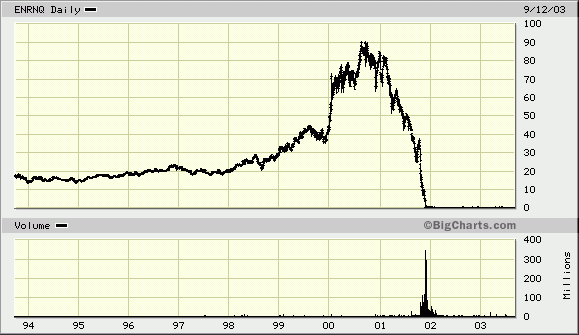Enron Corporation: Difference between revisions
Amwelladmin (talk | contribs) Redirected page to Enron ron |
Amwelladmin (talk | contribs) No edit summary |
||
| (6 intermediate revisions by the same user not shown) | |||
| Line 1: | Line 1: | ||
{{a|disaster|{{image|Enron-stock-chart|gif|A champagne supernova, yesterday. Courtesy of [https://www.begintoinvest.com/enron-stock-chart/ begintoinvest.com] }} }}One of the great, bestest corporate scandals of them all, because — with the exception of a couple of short-sellers and a determined junior journalist (step forward the awesome Bethany McLean) — ''no-one'' saw this coming. | |||
So when, freshly bruised by the latest dumpster fire, you compile and update your [[risk taxonomy]] to be prepared for the next one, consider how everyone missed Enron. It isn’t like they missed the red flags. They were all there in plain sight. ''They just didn’t think they were red flags''. | |||
With a hat-tip to the [[You’re wrong about...]] podcast, consider this Enron-lionising piece from [https://www.chron.com/business/article/Enron-Making-of-the-Market-maker-2013245.php the Houston Chronicle datelined 15 April 2001] less than eight months from its spectacular bankruptcy on December 3, 2001. Among the things that now would set your hooters off, but the world in April 2001 thought was pretty cool about Enron, was: | |||
*Enron was one of the largest contributors to George W. Bush’s presidential campaign. Ken Lay was personal friends with both Bush presidents and the firm had equally strong ties to the Democrats, including access to President Clinton | |||
*In 1987 Enron had a USD1bn rogue trading loss that they managed to mostly trade out of before disclosing to the market | |||
*In the late 90s Enron invested 2.9 billion in a disastrous Indian power plant that never made any money because the gas it generated was too expensive for the local market | |||
{{Sa}} | |||
*[[Enron ron]] | |||
Latest revision as of 15:55, 15 June 2023
|
Chez Guevara — Dining in style at the Disaster Café™
|
One of the great, bestest corporate scandals of them all, because — with the exception of a couple of short-sellers and a determined junior journalist (step forward the awesome Bethany McLean) — no-one saw this coming.
So when, freshly bruised by the latest dumpster fire, you compile and update your risk taxonomy to be prepared for the next one, consider how everyone missed Enron. It isn’t like they missed the red flags. They were all there in plain sight. They just didn’t think they were red flags.
With a hat-tip to the You’re wrong about... podcast, consider this Enron-lionising piece from the Houston Chronicle datelined 15 April 2001 less than eight months from its spectacular bankruptcy on December 3, 2001. Among the things that now would set your hooters off, but the world in April 2001 thought was pretty cool about Enron, was:
- Enron was one of the largest contributors to George W. Bush’s presidential campaign. Ken Lay was personal friends with both Bush presidents and the firm had equally strong ties to the Democrats, including access to President Clinton
- In 1987 Enron had a USD1bn rogue trading loss that they managed to mostly trade out of before disclosing to the market
- In the late 90s Enron invested 2.9 billion in a disastrous Indian power plant that never made any money because the gas it generated was too expensive for the local market
